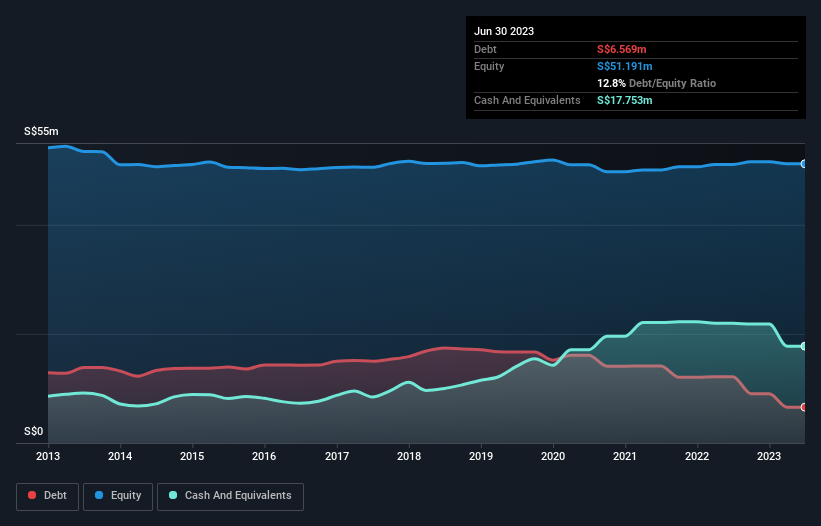The external fund manager backed by Berkshire Hathaway's Charlie Munger, Li Lu, makes no bones about it when he says 'The biggest investment risk is not the volatility of prices, but whether you will suffer a permanent loss of capital.' So it might be obvious that you need to consider debt, when you think about how risky any given stock is, because too much debt can sink a company. We can see that Qian Hu Corporation Limited (SGX:BCV) does use debt in its business. But the more important question is: how much risk is that debt creating?
What Risk Does Debt Bring?
Debt assists a business until the business has trouble paying it off, either with new capital or with free cash flow. Part and parcel of capitalism is the process of 'creative destruction' where failed businesses are mercilessly liquidated by their bankers. However, a more usual (but still expensive) situation is where a company must dilute shareholders at a cheap share price simply to get debt under control. By replacing dilution, though, debt can be an extremely good tool for businesses that need capital to invest in growth at high rates of return. When we think about a company's use of debt, we first look at cash and debt together.
Check out our latest analysis for Qian Hu
What Is Qian Hu's Debt?
As you can see below, Qian Hu had S$6.57m of debt at June 2023, down from S$12.2m a year prior. But on the other hand it also has S$17.8m in cash, leading to a S$11.2m net cash position.

How Strong Is Qian Hu's Balance Sheet?
Zooming in on the latest balance sheet data, we can see that Qian Hu had liabilities of S$16.5m due within 12 months and liabilities of S$1.62m due beyond that. On the other hand, it had cash of S$17.8m and S$11.7m worth of receivables due within a year. So it actually has S$11.4m more liquid assets than total liabilities.
This surplus strongly suggests that Qian Hu has a rock-solid balance sheet (and the debt is of no concern whatsoever). Having regard to this fact, we think its balance sheet is as strong as an ox. Succinctly put, Qian Hu boasts net cash, so it's fair to say it does not have a heavy debt load!
Shareholders should be aware that Qian Hu's EBIT was down 48% last year. If that decline continues then paying off debt will be harder than selling foie gras at a vegan convention. The balance sheet is clearly the area to focus on when you are analysing debt. But you can't view debt in total isolation; since Qian Hu will need earnings to service that debt. So if you're keen to discover more about its earnings, it might be worth checking out this graph of its long term earnings trend.
But our final consideration is also important, because a company cannot pay debt with paper profits; it needs cold hard cash. While Qian Hu has net cash on its balance sheet, it's still worth taking a look at its ability to convert earnings before interest and tax (EBIT) to free cash flow, to help us understand how quickly it is building (or eroding) that cash balance. Happily for any shareholders, Qian Hu actually produced more free cash flow than EBIT over the last three years. There's nothing better than incoming cash when it comes to staying in your lenders' good graces.
Summing Up
While we empathize with investors who find debt concerning, you should keep in mind that Qian Hu has net cash of S$11.2m, as well as more liquid assets than liabilities. And it impressed us with free cash flow of S$3.6m, being 405% of its EBIT. So is Qian Hu's debt a risk? It doesn't seem so to us. There's no doubt that we learn most about debt from the balance sheet. However, not all investment risk resides within the balance sheet - far from it. For example Qian Hu has 3 warning signs (and 1 which makes us a bit uncomfortable) we think you should know about.
When all is said and done, sometimes its easier to focus on companies that don't even need debt. Readers can access a list of growth stocks with zero net debt 100% free, right now.
Valuation is complex, but we're here to simplify it.
Discover if Qian Hu might be undervalued or overvalued with our detailed analysis, featuring fair value estimates, potential risks, dividends, insider trades, and its financial condition.
Access Free AnalysisHave feedback on this article? Concerned about the content? Get in touch with us directly. Alternatively, email editorial-team (at) simplywallst.com.
This article by Simply Wall St is general in nature. We provide commentary based on historical data and analyst forecasts only using an unbiased methodology and our articles are not intended to be financial advice. It does not constitute a recommendation to buy or sell any stock, and does not take account of your objectives, or your financial situation. We aim to bring you long-term focused analysis driven by fundamental data. Note that our analysis may not factor in the latest price-sensitive company announcements or qualitative material. Simply Wall St has no position in any stocks mentioned.
About SGX:BCV
Qian Hu
Provides ornamental fish services primarily in Singapore, rest of Asian countries, Europe, and internationally.
Excellent balance sheet with slight risk.
Market Insights
Community Narratives



